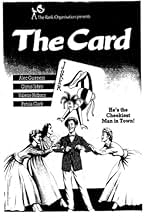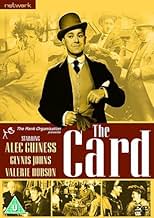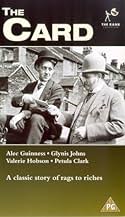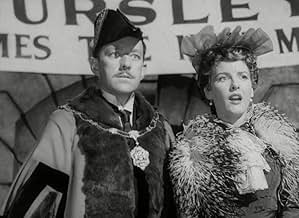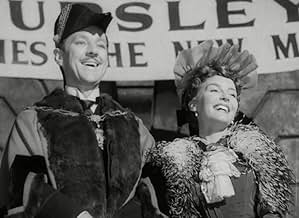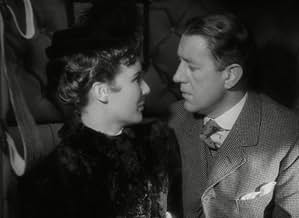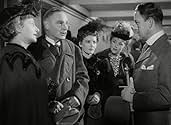Edward Machin, an Edwardian-era young rogue of lowly origin, decides he must do what he can to raise his living standards in order to see the world and shape his own destiny.Edward Machin, an Edwardian-era young rogue of lowly origin, decides he must do what he can to raise his living standards in order to see the world and shape his own destiny.Edward Machin, an Edwardian-era young rogue of lowly origin, decides he must do what he can to raise his living standards in order to see the world and shape his own destiny.
- Nominated for 1 Oscar
- 1 nomination total
John Adams
- Customs Official
- (uncredited)
Peter Copley
- P. Shillitoe
- (uncredited)
Mark Daly
- Lord Mayor
- (uncredited)
Arthur Dibbs
- Doorman
- (uncredited)
Deidre Doyle
- Widow Hullins
- (uncredited)
Henry Edwards
- Mr. Cotterill
- (uncredited)
- Director
- Writers
- All cast & crew
- Production, box office & more at IMDbPro
Featured reviews
It's easy to like this charming, unpretentious film in which Alec Guinness's restrained performance hits all the right notes. His fine work during the early 50's is unfortunately overshadowed by the public's identification with him in such big budget productions as The Bridge Over the River Kwai and Lawrence of Arabia. It's the "small movies" like this one (The Lady Killers, The Last Holiday, The Captain's Paradise and Man in the White Suit also come to mind) where we see his real skill and genius. The Card is enhanced by the appealing characters played by Glynis Johns and Valerie Hobson. Fans will also recall Hobson in another Guinness film, Kind Hearts and Coronets. One bit of puzzling trivia: How did Eric Ambler, known mostly for his espionage novels and, later, for Topkapi, come to write the screenplay for this gentle comedy?....
10gray4
One of the greatest British comedies of the 1950s and one of Alec Guinness' most satisfying roles early in his long career. As Denry Machin, son of a washerwoman and the "card" of the title, Guiness brings to life one of the almost forgotten stories about the "five towns" (Stoke-on-Trent) of Arnold Bennett. The old-fashioned and very English word "card" had to be translated into the American title "the promoter", but that is a far less accurate description of Denry Machin's combination of charm and opportunism.
He is supported by four magical actresses, in sharply contrasted roles. Gold-digger Glynis Johns, her friend Petula Clark, aristocrat Valerie Hobson and mother Valerie Turleigh are all charmed in their different ways by Guiness' smiles as he "gives providence a helping hand". William Alwyn's music is perfect, with a jaunty theme-tune that has lingered in my memory for more years than I care to remember. Ronald Neame's direction, also at the start of an impressive directorial career, brings the best out of Guinness, although the setting is disappointingly 'comedy-Northern' rather than specifically Stoke-on-Trent.
Overall a delightful film, and the perfect pick-me-up after watching a depressing Hollywood block-buster (Million Dollar Baby). And watch out for one of the movies' great sign-off lines, from Valerie Hobson.
He is supported by four magical actresses, in sharply contrasted roles. Gold-digger Glynis Johns, her friend Petula Clark, aristocrat Valerie Hobson and mother Valerie Turleigh are all charmed in their different ways by Guiness' smiles as he "gives providence a helping hand". William Alwyn's music is perfect, with a jaunty theme-tune that has lingered in my memory for more years than I care to remember. Ronald Neame's direction, also at the start of an impressive directorial career, brings the best out of Guinness, although the setting is disappointingly 'comedy-Northern' rather than specifically Stoke-on-Trent.
Overall a delightful film, and the perfect pick-me-up after watching a depressing Hollywood block-buster (Million Dollar Baby). And watch out for one of the movies' great sign-off lines, from Valerie Hobson.
This terrific 1952 British black and white movie directed by Ronald Neame (with an inspired casting of a young Alec Guinness as Arnold Bennett's wonderful character, the upwardly-mobile Denry Machin), loses none of the story's magic and captures the flavour of the period (from about 1888 and onwards) and the Potteries (North Staffordshire, England) absolutely perfectly. The ballroom scene (among many others) is an utter delight.
The beautiful Valerie Hobson as the "Countess of Chell" is enchanting. Glynis Johns as the frivolous and extravagant social-climbing dance instructress is equally lovely. Edward Chapman as Mr Duncalf is at his usual pompous best. A marvellous supporting cast puts in a stalwart performance and are all on top form, and the acting by all involved is superb (although Petula Clark is a little too reserved and somewhat bland), but after all that, the star of the show surely has to be Joey the Mule.
I don't intend to give you the storyline as enough reviewers have done that already. Suffice it to say that of all the transferences of classic stories to the screen, this must be one of the best, and I defy anyone (young or old) who may watch it, not to enjoy it (even though it is in black and white), and unfortunately, even with colour and much improved modern techniques, marvellous movies like this just aren't made anymore.
The beautiful Valerie Hobson as the "Countess of Chell" is enchanting. Glynis Johns as the frivolous and extravagant social-climbing dance instructress is equally lovely. Edward Chapman as Mr Duncalf is at his usual pompous best. A marvellous supporting cast puts in a stalwart performance and are all on top form, and the acting by all involved is superb (although Petula Clark is a little too reserved and somewhat bland), but after all that, the star of the show surely has to be Joey the Mule.
I don't intend to give you the storyline as enough reviewers have done that already. Suffice it to say that of all the transferences of classic stories to the screen, this must be one of the best, and I defy anyone (young or old) who may watch it, not to enjoy it (even though it is in black and white), and unfortunately, even with colour and much improved modern techniques, marvellous movies like this just aren't made anymore.
Very well adapted from the novel by Arnold Bennett, this is a warm and witty comedy about the rise of a washerwoman's son from obscurity to becoming the Mayor. In a series of episodes Edward Henry (Denry as his mother called him) Machin demonstrates his acumen in business, his eye for the main chance, noticing what Shakespeare called the 'tide in the affairs of men that leads on to fortune'. (Literally in one episode!)
In all of his this you can not help liking Denry, especially as he is perfectly played by Alec Guinness. As the narrator says, he is not dishonest, he just likes to give providence a helping hand. As Denry grows older Guinness wonderfully captures each facet of his character. He is well supported by the other cast members, each one also perfect for their roles. It is hard to think of a better cast film, even down to the small roles.
The film captures well the look of the Potteries. The small houses, the pottery kilns, the canal. This place is living and breathing, populated by interesting people. An excellent film, splendid in all departments and well worth seeing many times.
In all of his this you can not help liking Denry, especially as he is perfectly played by Alec Guinness. As the narrator says, he is not dishonest, he just likes to give providence a helping hand. As Denry grows older Guinness wonderfully captures each facet of his character. He is well supported by the other cast members, each one also perfect for their roles. It is hard to think of a better cast film, even down to the small roles.
The film captures well the look of the Potteries. The small houses, the pottery kilns, the canal. This place is living and breathing, populated by interesting people. An excellent film, splendid in all departments and well worth seeing many times.
The Card must have been an interesting if somewhat painful film for Alec Guinness to make. This might have been the most autobiographical piece of work Guinness ever did.
In The Card Guinness plays the son of washerwoman who learned early on to keep an eye out for the main chance and always strive to improve yourself by whatever means. In real life Guinness's mother should only have been a washerwoman In fact she was a prostitute who never married his father, whomever that could have been. In real life Guinness overcame bigger obstacles than his character in The Card ever did.
But I'm sure he drew from real life in playing Denny Machin. Guinness in 91 minutes goes from a humble clerk to a position of real power in his area of England. The story is how he did it, the legal and extralegal methods employed and the people he used. When you think about it, The Card is a kinder, gentler version of Room At The Top.
Guinness courts two women on his way up, Valerie Hobson the widow of a local lord and dancing instructor Glynis Johns. Glynis is quite the climber herself as we learn when the story unfolds. In fact she nearly steals the film from Guinness, no easy task.
The Card which was released in the USA under the title of The Promoter is a good followup to such other Guinness everyman roles like he had in The Lavendar Hill Mob. The screenplay is quite good, I was kept very entertained seeing how Guinness could always make lemonade out of lemons. Definitely required viewing for Alec Guinness's legion of fans.
In The Card Guinness plays the son of washerwoman who learned early on to keep an eye out for the main chance and always strive to improve yourself by whatever means. In real life Guinness's mother should only have been a washerwoman In fact she was a prostitute who never married his father, whomever that could have been. In real life Guinness overcame bigger obstacles than his character in The Card ever did.
But I'm sure he drew from real life in playing Denny Machin. Guinness in 91 minutes goes from a humble clerk to a position of real power in his area of England. The story is how he did it, the legal and extralegal methods employed and the people he used. When you think about it, The Card is a kinder, gentler version of Room At The Top.
Guinness courts two women on his way up, Valerie Hobson the widow of a local lord and dancing instructor Glynis Johns. Glynis is quite the climber herself as we learn when the story unfolds. In fact she nearly steals the film from Guinness, no easy task.
The Card which was released in the USA under the title of The Promoter is a good followup to such other Guinness everyman roles like he had in The Lavendar Hill Mob. The screenplay is quite good, I was kept very entertained seeing how Guinness could always make lemonade out of lemons. Definitely required viewing for Alec Guinness's legion of fans.
Did you know
- TriviaBursley, the town where this movie takes place, is a fictionalized version of Burslem, one of the constituent towns that make up Stoke-on-Trent, also known as the "Potteries" or, as in the movie, "the city of five towns".
- GoofsWhen Denry looks at the invitation to the dance he has received in the mail at home, is name is written completely different than when he filled it out himself at work previously.
- Quotes
Mrs. Machin: You can live where ya like... but i'm stayin' here.
- How long is The Promoter?Powered by Alexa
Details
- Release date
- Country of origin
- Language
- Also known as
- The Promoter
- Filming locations
- Llandudno, Conwy, Wales, UK(where Denry goes on vacation)
- Production companies
- See more company credits at IMDbPro
- Runtime1 hour 31 minutes
- Color
- Aspect ratio
- 1.37 : 1
Contribute to this page
Suggest an edit or add missing content


